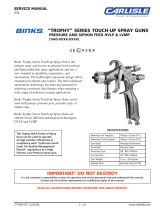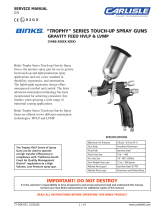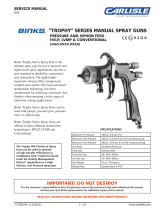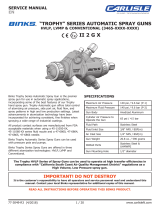Page is loading ...

CleanAir
centrifugal
air filter unit
Fluid Pressure
Gauge
Safety Va lve
(Do not tamper with
or readjust)
Fluid Pressure
Regulator
Ai r
Adjusting
Va lve
(not included)
Fluid Hose
(not included)
Air Hose
(not included)
Air Release
Va lve
(not included)
Air Nozzle
Lubricate
Cup Threads
SPECIFICATIONS
MAX. CUP PRESSURE 50 psig 3.5 bar
OVERALL HEIGHT
WITH AUXILIARY HANDLE 16-15/16 in. 430 mm
OVERALL HEIGHT
W/O AUXILIARY HANDLE 13 in. 330 mm
BASE DIAMETER 5-1/4 in. 133 mm
AIR INLET & OUTLET CONNECTION 1/4 NPS (m)
FLUID INLET & OUTLET CONNECTION 3/8 NPS (m)
FLUID CAPACITY 2 qts. (US) 1.9 ltr
WEIGHT 3 lb. 3 oz. 1.46 kg
OPERATION AND CLEANING
External Mix Air Nozzle Application
Operation:
1. Connect hose as shown in diagram on front page.
2. Fill cup with strained fluid mixed in accordance with
manufacturer’s recommendations on label of container.
3. Fasten cover securely.
4. Close air adjusting valve by turning clockwise.
5. Set air pressure at CleanAir filter unit to between 35 and 80 PSI,
depending upon atomization desired.
6. Set regulator on pressure cup to approximately 10 PSI for
enamels; 5 PSI for lacquers. (Turn knob clockwise to increase
pressure; to reduce pressure, turn knob counter-clockwise. Always
release air in cup by momentarily opening air release valve on
cover when attempting to reduce pressure.)
7. Open air adjusting valve.
8. With trigger fully pulled back, make several fast spray strokes
against a flat surface. After adjustment of pressure, proper
atomization will be indicated by an even distribution of finely
divided paint particles.
IMPORTANT
The most efficient atomization air pressure is the lowest air pressure
that will properly atomize the paint. This will minimize the overspray,
deposit more paint on the surface and eliminate paint waste.
If a faster coverage is necessary, first increase fluid pressure and then
adjust atomization air pressure. If a slower coverage is more
desirable, first reduce the fluid pressure and then adjust atomization
air pressure. Always attempt to maintain the lowest pressures for
maximum efficiency.
For ease of removing cup cover and to prevent leakage, always
thoroughly grease the threads on the cup.
If the cup is accidentally tipped over or held at too great an
angle, fluid will load up the underside of cup cover, and leak
into regulator. In the event this happens, clean immediately!
!
CAUTION
(continued on page 3)
MODEL 80-295 (2 QT.) “STEADI-GRIP”
PRESSURE CONTAINER
Halogenated hydrocarbon solvents – for example: 1,1,1, -
trichloroethane and methylene chloride – can chemically
react with aluminum parts and components and cause an
explosion hazard. These solvents will also corrode the
galvanized tank coating. Read the label or data sheet for the
material. Do not use materials containing these solvents with
these pressure containers.
!
WARNING
To loosen or tighten the cover from/to the cup, grasp the
cover and the base separately and twist. Do not attempt to
loosen or tighten the cover grasping the air regulator or
outlet assembly.
NOTE
77-2823-R13 (2/2022) 1 / 4 www.carlisleft.com
EN
SERVICE MANUAL

LOCK OUT / TAG-OUT
Failure to de-energize, disconnect, lock out and tag-out all power
sources before performing equipment maintenance could cause
serious injury or death.
OPERATOR TRAINING
All personnel must be trained before operating finishing
equipment.
EQUIPMENT MISUSE HAZARD
Equipment misuse can cause the equipment to rupture,
malfunction, or start unexpectedly and result in serious injury.
PROJECTILE HAZARD
You may be injured by venting liquids or gases that are released
under pressure, or flying debris.
PINCH POINT HAZARD
Moving parts can crush and cut. Pinch points are basically any
areas where there are moving parts.
INSPECT THE EQUIPMENT DAILY
Inspect the equipment for worn or broken parts on a daily basis.
Do not operate the equipment if you are uncertain about its
condition.
In this part sheet, the words WARNING, CAUTION and NOTE are used to
emphasize important safety information as follows:
Hazards or unsafe practices which
could result in minor personal injury,
product or property damage.
!
CAUTION
Hazards or unsafe practices which
could result in severe personal
injury, death or substantial property
damage.
!
WARNING
Important installation, operation or
maintenance information.
NOTE
Read the following warnings before using this equipment.
READ THE MANUAL
Before operating finishing equipment, read and understand all
safety, operation and maintenance information provided in the
operation manual.
WEAR SAFETY GLASSES
Failure to wear safety glasses with side shields could result in
serious eye injury or blindness.
NEVER MODIFY THE EQUIPMENT
Do not modify the equipment unless the manufacturer provides
written approval.
IT IS THE RESPONSIBILITY OF THE EMPLOYER TO PROVIDE THIS INFORMATION TO THE OPERATOR OF THE EQUIPMENT.
FOR FURTHER SAFETY INFORMATION REGARDING THIS EQUIPMENT, SEE THE GENERAL EQUIPMENT SAFETY BOOKLET (77-5300).
KNOW WHERE AND HOW TO SHUT OFF THE EQUIPMENT
IN CASE OF AN EMERGENCY
PRESSURE RELIEF PROCEDURE
Always follow the pressure relief procedure in the equipment
instruction manual.
NOISE HAZARD
You may be injured by loud noise. Hearing protection may be
required when using this equipment.
STATIC CHARGE
Fluid may develop a static charge that must be dissipated through
proper grounding of the equipment, objects to be sprayed and all
other electrically conductive objects in the dispensing area. Improper
grounding or sparks can cause a hazardous condition and result in
fire, explosion or electric shock and other serious injury.
WEAR RESPIRATOR
Toxic fumes can cause serious injury or death if inhaled.
Wear a respirator as recommended by the fluid and solvent
manufacturer’s Safety Data Sheet.
TOXIC FLUID & FUMES
Hazardous fluid or toxic fumes can cause serious injury or death if
splashed in the eyes or on the skin, inhaled, injected or
swallowed. LEARN and KNOW the specific hazards or the fluids
you are using.
KEEP EQUIPMENT GUARDS IN PLACE
Do not operate the equipment if the safety devices have been
removed.
!
WARNING
AUTOMATIC EQUIPMENT
Automatic equipment may start suddenly without warning.
FIRE AND EXPLOSION HAZARD
Improper equipment grounding, poor ventilation, open flame or
sparks can cause a hazardous condition and result in fire or
explosion and serious injury.
MEDICAL ALERT
Any injury caused by high pressure liquid can be serious. If you
are injured or even suspect an injury:
• Go to an emergency room immediately.
• Tell the doctor you suspect an injection injury.
• Show the doctor this medical information or the medical alert
card provided with your airless spray equipment.
• Tell the doctor what kind of fluid you were spraying or
dispensing.
GET IMMEDIATE MEDICAL ATTENTION
To prevent contact with the fluid, please note the following:
• Never point the gun/valve at anyone or any part of the body.
• Never put hand or fingers over the spray tip.
• Never attempt to stop or deflect fluid leaks with your hand,
body, glove or rag.
• Always have the tip guard on the spray gun before spraying.
• Always ensure that the gun trigger safety operates before
spraying.
EN
77-2823-R13 (2/2022)2 / 4www.carlisleft.com

80-295 PARTS LIST
Ref.
No.
Replacement
Part No. Description
Ind.
Parts
Req'd.
1 80-4 CUP, 2 QUART 1
2 80-34 TUBE, MATERIAL 1
3 80-11* GASKET, TRI SEAL FOAM 1
4 80-297 COVER 1
5 80-12 AIR RELEASE VALVE 1
672-1022 sCENTERPOST ASSEMBLY 1
7 80-33 OUTLET 1
8 20-353-1 JAM NUT, 5/16-18 1
9 83-1899 HANDLE 1
10 85-440
AIR REGULATOR ASSEMBLY
(MAX. 50 PSI FLUID PRESSURE)
(See part sheet 2817)
1
11 80-267 VALVE 1
12 60-7 SPRING 1
* Available in quantity pack. For Tri-Seal Gaskets, order 80-11-5 (qty. of 5).
s Available from Binks distributors only.
OPERATION AND CLEANING
Internal Mix Air Nozzle Application
Operation:
The steps are the same as with the external mix nozzles,
except the air and fluid pressure settings are different.
NOTE
The internal mix air nozzle accomplishes atomization by mixing the air
and fluid within the air nozzle.
1. Close air adjusting valve by turning clockwise.
2. Set air pressure at CleanAir filter unit to approximately 45 PSI.
3. Open air adjusting valve and allow air to enter the gun.
4. Set fluid pressure at 20 lbs. and adjust higher or lower until
desired atomization is effected. Air pressure should be alternately
adjusted.
Cleaning:
1. Open air release valve on pressure cup cover.
2. Reduce pressure in cup until gauge reads zero, (turn knob
counter-clockwise).
3. Loosen cup cover and set fluid tube on angle in cup.
4. Loosen air nozzle two turns, place cloth over nozzle and pull the
trigger to force paint into cup.
5. Remove cover and clean cup and cover thoroughly.
6. With approximately 1/4 to 1/2 cup of clean solvent, attach cover
and set fluid pressure at approximately 10 PSI.
7. Close air adjusting valve at spray gun.
8. Trigger gun and allow solvent to flow into a container until it flows
clear.
9. Remove solvent, then clean air nozzle. If any dirt appears in
orifice, clean with tooth pick Blow nozzle and cup dry. Replace
nozzle and cover loosely.
Never use a wire or metal object to clean the air nozzle—
they may damage the nozzle and cause faulty spray.
!
CAUTION
Never allow solvent to remain in cup; solvent vapors tend to
reduce service life of gasket. Separate storage of cup and
cover recommended.
NOTE
BINKS MODEL 80-295 (2 QT.) “STEADI-GRIP” PRESSURE CONTAINER
ACCESSORY – ORDER SEPARATELY
85-441
ATOMIZING AIR
REGULATOR KIT
Second regulator kit
for atomizing air control.
(MAX. 60 PSI)
EN
77-2823-R13 (2/2022) 3 / 4 www.carlisleft.com

EN
77-2823-R13 (2/2022)4 / 4www.carlisleft.com
WARRANTY POLICY
This product is covered by Carlisle Fluid Technologies’ materials and workmanship limited warranty.
The use of any parts or accessories, from a source other than Carlisle Fluid Technologies,
will void all warranties. Failure to reasonably follow any maintenance guidance provided
may invalidate any warranty.
For specic warranty information please contact Carlisle Fluid Technologies.
Carlisle Fluid Technologies is a global leader in innovative nishing technologies.
Carlisle Fluid Technologies reserves the right to modify equipment specications without prior notice.
BGK™, Binks®, DeVilbiss®, Hosco®, MS®, and Ransburg®
are all registered trademarks of Carlisle Fluid Technologies, Inc.
©2022 Carlisle Fluid Technologies, Inc.
All rights reserved.
For technical assistance or to locate an authorized distributor,
contact one of our international sales and customer support locations.
Region Industrial/Automotive Automotive Renishing
Americas Tel: 1-800-992-4657 Tel: 1-800-445-3988
Fax: 1-888-246-5732 Fax: 1-800-445-6643
Europe, Africa,
Middle East, India
Tel: +44 (0)1202 571 111
Fax: +44 (0)1202 573 488
China Tel: +8621-3373 0108
Fax: +8621-3373 0308
Japan Tel: +81 45 785 6421
Fax: +81 45 785 6517
Australia Tel: +61 (0) 2 8525 7555
Fax: +61 (0) 2 8525 7575
For the latest information about our products, visit www.carlisleft.com
/








